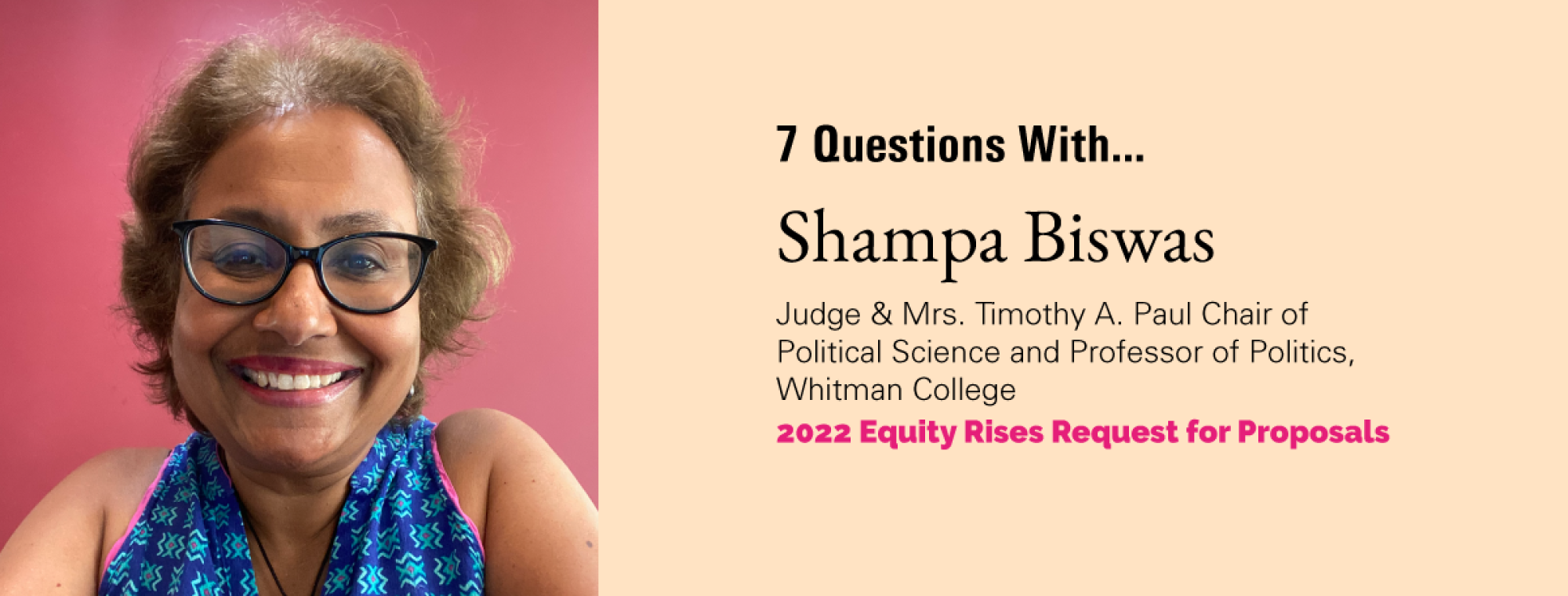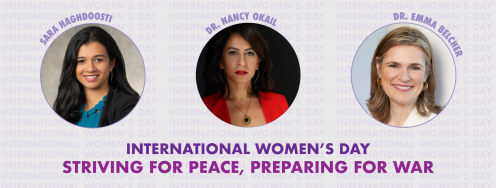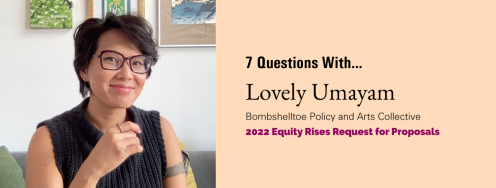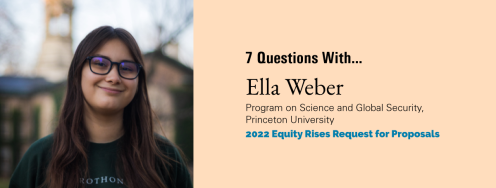Shampa Biswas is Judge & Mrs. Timothy A. Paul Chair of Political Science and Professor of Politics at Whitman College. She has written and taught extensively on nuclear non-proliferation and disarmament, global security, race in international relations, global development, nationalism, globalization, and gender, and South Asian politics. This is part of a series of interviews in which you can get to know the grants given under the 2022 Equity Rises Request for Proposals and the people behind all the work.
Question 1: Tell us about your work! What kind of goals do you have? What are you excited about?
The ambition of our Ploughshares grant is to transform the nuclear studies curriculum by making antiracism, postcolonialism, and feminism central to the teaching of nuclear weapons policy and practice. Our plan is to build teaching modules addressing questions of race, colonialism, gender, disability, and environmental justice that can be incorporated into existing or new syllabi that will then be distributed via the online platform Highly NRiched. Each module will provide a teaching plan and resources for educators to use, including texts, interviews with experts and activists, classroom exercises and activities, multimedia resources (videos, simulations, etc.), and creative assignments. I and my collaborator Dr. Anne Harrington are excited to be working with teams of highly-accomplished and diverse teacher-scholars from around the world to build these modules, as well as with web designers and developers who will be assisting module builders.
We believe that education is key to changing approaches to nuclear weapons thinking and policy. For nuclear disarmament to become a real possibility, young people need to learn to think outside of the box of nuclear strategic discourse. That requires the incorporation of antiracist and intersectional approaches into teaching on nuclear policy and strategy. We will contribute to decolonizing the field of nuclear studies by making explicit the connections between nuclear weapons policy and strategy and colonial and racial history, the politics of gender and sexuality, and environmental impacts on landscape and various life forms. We also aim to increase the visibility of intersectional experts from marginal communities who have been documenting and analyzing nuclear security from the perspective of racial and colonial minorities using feminist and queer lenses. We hope that our work will make a substantial contribution to decolonizing nuclear studies by both diversifying its content and making it more inviting to students from diverse backgrounds.
Question 2: In what ways do nuclear politics intersect with colonialism, racism, feminism, environmentalism, etc?
Colonialism, racism, and sexism are at the very heart of nuclear politics, from the global to local levels. Right from the start of the nuclear era, the possession of nuclear weapons has driven great power politics, allowing wealthy, white powerful states to bully poor, weak brown and black states. Nuclear weapons allowed former colonial states like Great Britain and France to maintain their power in a decolonizing world, while the two primary nuclear adversaries during the Cold War exported their rivalry in proxy wars to third world states in Asia, Africa, and Latin America. The highly celebrated Nuclear Non-Proliferation Treaty ended up entrenching these hierarchical nuclear relations – sometimes described as ‘nuclear apartheid’ – by creating a ‘club’ of nuclear weapons states who were allowed to retain their nuclear weapons while everyone else was expected to forsake them.
This also had the effect of making nuclear weapons into status symbols, driving a form of colonial mimicry in which some insecure third world states who could ill-afford these powerful instruments of death came to desire and pursue them. While ostensibly pursued for reasons of ‘deterrence’ and never intended to be ‘used,’ the production and testing of nuclear weapons have disproportionately harmed indigenous and colonized peoples and their local ecologies – starting with the perilous mining of uranium to the devastation of nuclear testing, along with the contaminated futures of communities living with nuclear waste. Thus, nuclear weapons help create and maintain a highly unequal international order among states, even as its consequences are borne by racially and ethnically marginalized groups in both first world and third world states. Feminist, indigenous, and anti-colonial scholars and peace activists have long called out the masculinist militarism that drives nuclear weapons policy and pushed for the articulation of more humane people and eco-centered notions of ‘security’ that can generate a world free of nuclear weapons.
Question 3: Who or what motivates you?
I am an educator. I am surrounded everyday by bright and curious young people who want to make a difference. The pandemic took a huge toll on our young people, who now find themselves living in a world on the brink of a possible nuclear war and facing a rapidly warming planet. I sometimes wonder how bleak the future must appear to them. And yet my students come to my classes with such desire to learn and passion to create change that it fills me with great hope. They ask incisive questions, they show me everyday what it means to practice critical thinking, and they are willing to risk pushing their intellectual and personal boundaries while my generation seems increasingly divided into their corners unwilling to engage with others. My students don’t just motivate me, they inspire me. I applied for this grant because I believe we owe them the education they deserve.
Question 4: You’ve written multiple publications about nuclear disarmament and abolition, including your book Nuclear Desire: Power and the Post Colonial Nuclear Order. What questions do you ask yourself when investigating these stories? What do you look for?
My entry into nuclear studies is as a postcolonial International Relations theorist. I am interested in interrogating how the institutions and practices of the contemporary world are shaped by colonial relations of the historical past and the complex mechanisms through which unequal global relations are maintained and can be dismantled. When examining the global nuclear order, I have often asked: Who does the international community authorize or legitimize to possess nuclear weapons and in whose hands are these weapons considered too dangerous? Who profits from the production and maintenance of nuclear weapons and who is harmed by them? What would ‘security’ look like if instead of looking at it from the perspective of powerful states, we switched our lens to the views of the most marginal groups around the world? Asking these questions ends up centering the role of race and its intersections with class and gender in the stories we tell about global nuclear politics.
Question 5: What’s the one thing about the nuclear policy field you wish people knew or would talk about more often?
It is widely known that nuclear weapons are dangerous because of the catastrophic damage they can inflict when used in war. And yet most people in nuclear weapons states that possess massive numbers of nuclear weapons pay little attention to them on a day-to-day basis. It appears to me that there is so much complacency around the continued existence of nuclear weapons because not only have they not been in used in war for 70+ years, but also because many people are persuaded by the deterrent logic that states use to justify their possession of nuclear weapons.
But nuclear weapons are dangerous not just because they might be used in some future war (which, with the Russian invasion of Ukraine, might seem closer to the present than some indeterminate future), but also through its entire production cycle – harming and killing through radioactive contamination at every stage from uranium mining, to milling and processing, plutonium production, weaponizing, to testing and use. I wish more people would think about the entire nuclear fuel cycle, not just nuclear weapons as finished products, which would also help make more people aware of the presence of things nuclear all around them (i.e. how close to nuclear dangers they live everyday) and the ways that communities of color have been disproportionately harmed by the acquisition and testing of nuclear weapons. It seems to me that more attention by citizens of nuclear weapons states to everyday forms of nuclear dangers might help generate more pressure on those states to work toward nuclear disarmament.
Question 6: What advice do you have for someone trying to enter the nuclear policy and security field?
Many of my students are intimidated by entering the nuclear policy and security field because it appears to be a highly specialized area that requires a lot of expertise, which they sometimes understand as the ability to wield the weighty technical jargon of the field in order to speak with any authority. This also makes nuclear policy and security issues seem far from their everyday lives and concerns, which are taken up much more by questions of climate change, economic security, and racial justice.
I want more young people to (a) realize that a well-rounded education that has trained them to think analytically and critically about questions of social and political import very much qualifies them to enter and make contributions to the field of nuclear policy and security, and (b) understand that questions of climate change, economic security, and racial justice are intimately connected to nuclear policy and security. I think we need young, questioning, creative minds from a variety of racially and ethnically diverse backgrounds to bring fresh perspectives to a field that has been dominated by narrowly-defined conceptions of security and led predominately by white men. I would like young people of color to know that they belong in the nuclear policy and security field, which has seen rich contributions from many thinkers and activists of color whose voices may be less visible but are very much present.
Question 7: What is the best book you’ve read recently?
Sing, Unburied, Sing by Jesmyn Ward
Seven Questions with Shampa Biswas @ShampaBiswasWW




